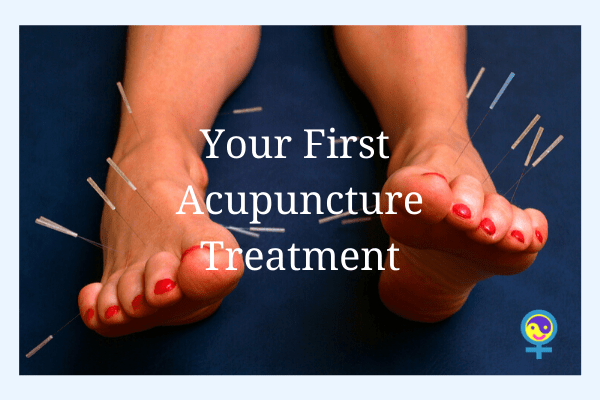I first experienced acupuncture during a Chinese Medicine class on the topic at The Graduate Institute in August of 2011. It was quite an exhilarating experience that led me to seek additional appointments. – Michelle

Here are the nuts and bolts of what an acupuncture appointment is all about:
What to bring to an acupuncture appointment
In order to give your Acupuncturist the most complete picture of your current health, it is best to bring them your latest blood work results, all the nutritional and herbal supplements you have been taking, and possibly even a food diary. You should also bring a bottle of water and a healthy snack (a banana or apple is great) should you need it following your treatment.
What to wear to an acupuncture appointment
Many acupuncture points are accessed via the abdomen, lower leg, arms, and ears (auricular acupuncture) so wearing loose clothing or shorts and a T-shirt make it possible to stay clothed during your appointment. However, the Acupuncturist may ask you to disrobe to your underwear if they feel they will need to access additional points, so plan for that. If this makes you uncomfortable don’t be afraid to speak up, because other options could be explored.
What happens during an acupuncture treatment
Your first acupuncture appointment will generally last over an hour. That is due to the fact that the Acupuncturist will be thoroughly examining you to determine the best treatment plan. It is possible that needles might not even be utilized if an herbal treatment is more appropriate for you.
Your acupuncture interview
The Acupuncturist will likely provide you with a detailed questionnaire asking about your eating, sleeping and drinking habits, along with your mood and current mental state. They will also ask questions about your medical history and any medications you are currently taking. After reviewing this information, they will likely ask you additional questions about your current health to get a better picture of why you are seeking treatment and how they can help your body to achieve balance, the aim of Chinese Medicine.
Your acupuncture assessment
Then the Acupuncturist will begin a physical review of your body. It is believed that the condition of the tongue provides information on the state of the entire body. As such, they will ask you to stick out your tongue so they can give it a thorough review. They will also assess your pulses. In Chinese Medicine there are actually four pulses that can be felt by holding each of your wrists. It is best for you to remain quiet during this time, as this requires careful concentration on the part of the Acupuncturist
Your acupuncture treatment
If your initial assessment indicates that your energy (qi) is too low to be stimulated, the Acupuncturist may opt to prescribe Chinese Herbs before proceeding to using needles at subsequent appointments. However, in most cases, they will proceed with a full acupuncture treatment. They will swipe the acupuncture points that they determine need stimulation with alcohol, and then they will insert tiny needles into those points. They may ask you to take a deep breath as they insert each needle (either on the inhalation or exhalation). The process is very quick and painless. You may feel a slight pinch when the needle is inserted, followed by a slight tingling. If you feel any discomfort, let the Acupuncturist know.
After all of the needles are in place the Acupuncturist will leave the room allowing time for the needles to do their work (around 30 minutes). A heat lamp is sometimes utilized to keep the body warm, as the needles have a cooling effect. If you begin to feel chilly or uncomfortable in any way don’t be afraid to call out to your Acupuncturist. Some will even give you a bell for that very purpose.
When the treatment is done, the Acupuncturist will remove the needles. You may be given water, or you might opt to drink some of your own. Once you are ready you can sit up and gather your things. But, do take it slow, as you may feel a bit dizzy as your body begins to realign. Following treatment, your Acupuncturist will talk to you again to be sure you are feeling well. They may also prescribe Chinese herbs to be taken between your next visit.
For more details on what acupuncture feels like, see “The Highs and Lows of Acupuncture.”
Acupuncture Tips
To provide the best experience possible for your appointment it is important that you are completely honest with your Acupuncturist. If you are nervous around needles, or feel uncomfortable at any point, let them know. Also, being completely honest about your health concerns is essential because their job is a tricky one and every detail you provide helps them pinpoint the problem (pun intended 😉).
When you are receiving treatment, it is best to just relax. Try closing your eyes and practicing deep breathing to maximize the relaxation effects. If you are at all squeamish avoid looking at the needles and focus your attention on a mantra (“I am healing”, “I am filled with positive energy”) or positive visual imagery (i.e., a relaxing place in nature, a favorite pet). Finally, always rise slowly after a treatment to prevent dizziness.
For more general information and additional resources, visit the Acupuncture and Chinese Medicine pages.
[Last Updated: 3/29/23]

Very helpful. Thank you.
Thanks Chelsea. Glad it helped you. I’m sorry it took so long to respond!